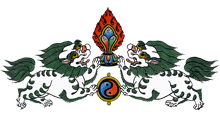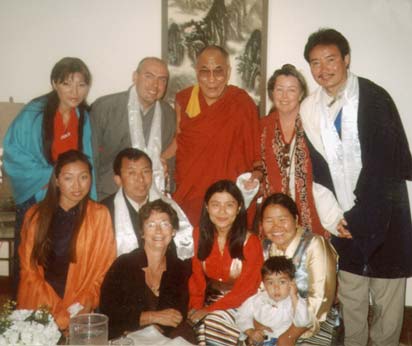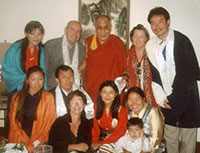1989 Tiananmen Square Massacre Commemorated in San Francisco
Vigil for Tiananmen Square; Activists Announce Online University
SAN FRANCISCO, CA (6/2)-Members of the Chinese Democracy Movement gathered in Portsmouth Square in San Francisco's Chinatown in an effort to commemorate the lives lost during the 1989 Tiananmen Square Massacre. Organizers of the event sent a message to people stating,"Please accept this as your kind invitation to join us at Sunday, June 2nd Candlelight Vigil for 24th Anniversary of Tiananmen Square Massacre with members of Chinese democracy groups, Bay Area Chinese and Tibetan Friendship and other Chinese, Tibetan & American friends...Please come and listen to the voices of the Tiananmen Mothers. Their children will play musical artistic performances in honor of the martyred heroes, thousands who were slain or injured around June 4, 1989. White flowers of mourning will laid at the feet of the Goddess of Democracy statue that resides at Portsmouth Square, Chinatown, in San Francisco. Prayers for World Peace will be offered...."
Leon of Oakland, and a former activist who survived the Tiananmen Square Massacre in 1989 remembered the events as if they were yesterday. According to him," Twenty-four years ago today, many Chinese university students and members of the community came together to protest the corruption of the Chinese Communist Party (CCP). They were calling for basic human rights. They were calling for basic reforms of the government. Because of this, the Chinese government sent in 300,000 troops to suppress the students and their protests. Now, the Chinese people continue to suffer under the corruption of the one party system currently in place. One of the things that is most dangerous is that the government, under the Chinese Communist Party decides how all resources are allocated across the country. For many people, they still have to struggle to meet their basic needs to survive, and many are still denied their basic human rights... We hope that the Chinese government can change its ways, that it will promote basic human rights to the people, the right to a clean government. We hope to realize that one day..."
Giovanni Vassallo, Bay Area Friends of Tibet (BAFoT) said of the event, "This is a candlelight vigil to remember the events of June 4th, 1989. I am a friend of Tibet and a friend to China, here to express my solidarity with the students and people who sacrificed their lives and freedom to fight for freedom of speech, freedom of expression, freedom of the press, and for so many other freedoms. It is for them we are here to pray for the souls of those who sacrificed their lived and for the soul of China, which would better and happier place for millions of people with the introduction of freedom and democracy,..."
Xin Lei Yang, University of California at Los Angeles (UCLA) said, "Today we are here to stand for those fighting for democracy in China and the United States. So we are here to memorialize those who lost their lives after the government's violent suppression of the students, which started out as a peaceful protest, from those who only wanted change in the political system. The Chinese Communist Party actually sent in the Army. With students and protesters coming from all over the country it is hard to actually know how many people were killed. Initially the Chinese government denied that there were any deaths. Many will never know, because files were lost, people were intimidated, and records erased. But event then, the government admits c. 240-280 deaths at a minimum took place in Tiananmen Square. But according to the International Red Cross, reports put the death toll at closer to c. 2,000-3,000 deaths. Many family members were simply not allowed to speak out or even claim the bodies of loved ones. We are here not only to memorialize the dead, but to protect and defend the ideas of freedom and democracy..."
To that end members of the Chinese Democracy movement announced that they are establishing an online university to promote the ideas of freedom and democracy through peaceful means. According to organizers," For Americans, "democracy" is a cherished and familiar word. Proud of their own democratic institutions, most Americans have felt warmed and vindicated by the worldwide movements demanding democracy in the past ten years. But democracy does not mean the same thing to all people everywhere; it changes each time it translates into a different language and cultural context. Democracy (translated into Chinese as " minzhu ," or "people-as-masters") is not a concept inherent in Chinese culture or political philosophy. In fact, it is in complete opposition to Confucian ideology, which stresses harmony and obedience. But neither is democracy a concept that has just recently taken hold in the minds of Chinese youth who have seen the wonders of democracy in Western-style discos and fast-food. The Chinese democratic tradition was begun nearly one hundred years before the white plaster statue erected on Tiananmen Square attracted the attention of the world. In those hundred years, it has been the cause of rebellions, arrests, purges, and endless debate on the best way to understand and implement such a complex form of social organization.Democracy was introduced to China almost single-handedly by an exiled Chinese writer named Liang Qichao. In 1895, he was involved in protests in Beijing calling for increased participation in government by the Chinese people. It was the first protest of its kind in modern Chinese history. Escaping to Japan after the government crackdown on anti-Qing protesters, he translated and commented on the works of Hobbes, Rousseau, Locke, Hume, Bentham and many more western political philosophers. He published his essays in a series of journals that easily found an audience among Chinese intelligentsia hungering for an explanation of why China, once a formidable empire of its own, was now on the verge of being dismembered by foreign powers. In interpreting Western democracy through the prism of his strongly Confucian background, Liang shaped the ideas of democracy that would be used throughout the next century...." As such, organizers announced that they will be establishing the online sites at Tiananmen.com and Tiananmen.net, further details will be released upon future notice.
- Jose Ricardo G. Bondoc
https://www.facebook.com/#!/media/set/?set=a.10151723328210817.107374200...
More pics at: https://www.facebook.com/#!/media/set/?set=a.311195579012411.1073741830....




